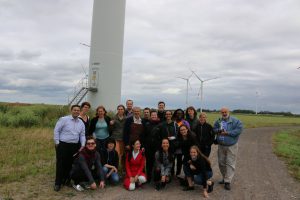This year’s Summer Academy “Sustainable Cities: Low Carbon Policy for the Urban Transition” took place on 17-22 July 2016 in Greifswald and Berlin.
The IKEM Summer Academy 2016 took place 17-22 July 2016 in Greifswald and Berlin. This year’s theme “Sustainable Cities: Low Carbon Policy for the Urban Transition” was treated from different perspectives that included the fields of climate change, energy and mobility. Participants and speakers from over 15 countries and 5 continents come together to learn and share their experiences from diverse professional and scientific backgrounds.
The Academy began on Sunday afternoon with a tour at the Ernst-Moritz-Arnd Universität Greifswald, one of the oldest universities in Germany. The tour started at Rubenow Monument, erected in honor of the mayor of the city and founder of the university Heinrich Rubenow. Amogst other facilities, we also visited the the former Studentenkarzer (student prison) which was used until 1914 and whose occupants left colorful drawings and stories on the walls. The evening ended with a dinner out on a boat on the river Ryck near the city center. This get-together provided the attendants with an opportunity to socialize and get to know each other.
Sustainable Cities in practice – international and German examples

The new week brought the start of the Summer Academy’s lecture series which was opened with an introduction to the importance of sustainability policies in cities based on the example of the Dutch capital Amsterdam. The subsequent (design) workshop helped the participants not only to work together in a relaxed and open-minded atmosphere, but also challenged them to creatively develop their own ideas about sustainable cities.
The afternoon focused on wind energy: In a Mecklenburg-Vorpommern wind farm, the Academy participants received valuable insight into the technical setup of a wind power plant. Afterwards, the partic
ipants enjoyed the windy beach of Lubmin overlooking the island Rügen – some even dared to take a dip into Baltic Sea.
The lectures on the following day reviewed the role of cities as an important part of the German energy transition and the municipalities’ concrete implementation plans. On their way to Berlin, the group visited the company ENTRAG’s power-to-gas hybrid power plant.
In the heart of the sustainable city – climate, energy and mobility
Once in Berlin, the Summer Academy continued with three intensive days of lectures and scientific exchange. Each day was dedicated to one of IKEM’s key issues: climate protection, energy and mobility.
Wednesday focused on climate protection: In addition to insights into the impact of climate change on cities, the implications of the Paris Agreements and the financing of sustainable urban development, specific country and city examples from the United States, Nigeria and China were examined. The summer evening ended with rhythmic samba sounds at a beach bar close to the river Spree.
The presentations of Thursday first dealt with the broad spectrum of current research for energy generation and energy efficiency. Highlighting the importance of consumer decisions and resource efficiency, a special focus was given to the field of food production and consumption.
Mobility was the center Friday’s lectures. Presentations on electric vehicles, car sharing and the vision of bikeways below Berlin’s elevated railway (metro U1) presented diverse project ideas for sustainable mobility in cities. The trend towards more automated driving has been a major topic of interest: This technology’s potential and advantages were discussed in the context of the existing legal framework and the respective issues at hand.
The Summer Academy 2016 ended with the traditional barbecue in Berlin-Neukölln. Participants, speakers and guests got a chance to review the topics of the past days and say goodbye to each other –this special event is to be repeated next year!
[button icon=”icon-external-link” title=”Summer Academy website: Link
[button icon=”icon-picture” title=”Pictures 2016: Link




